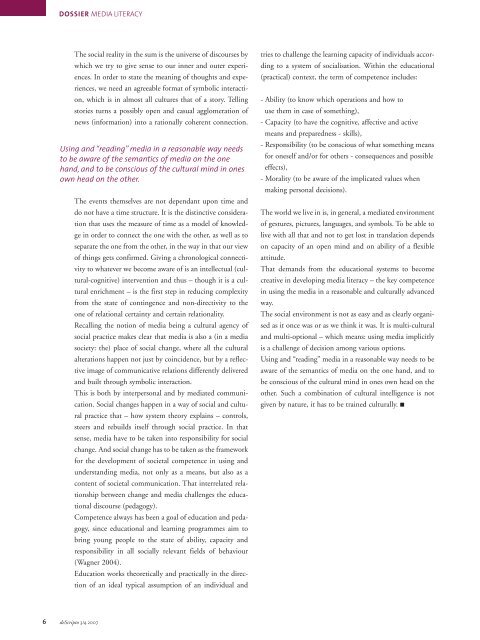DOSSIER
DOSSIER
DOSSIER
Create successful ePaper yourself
Turn your PDF publications into a flip-book with our unique Google optimized e-Paper software.
6<br />
<strong>DOSSIER</strong> MEDIA LITERACY<br />
The social reality in the sum is the universe of discourses by<br />
which we try to give sense to our inner and outer experiences.<br />
In order to state the meaning of thoughts and experiences,<br />
we need an agreeable format of symbolic interaction,<br />
which is in almost all cultures that of a story. Telling<br />
stories turns a possibly open and casual agglomeration of<br />
news (information) into a rationally coherent connection.<br />
Using and “reading” media in a reasonable way needs<br />
to be aware of the semantics of media on the one<br />
hand, and to be conscious of the cultural mind in ones<br />
own head on the other.<br />
The events themselves are not dependant upon time and<br />
do not have a time structure. It is the distinctive consideration<br />
that uses the measure of time as a model of knowledge<br />
in order to connect the one with the other, as well as to<br />
separate the one from the other, in the way in that our view<br />
of things gets confirmed. Giving a chronological connectivity<br />
to whatever we become aware of is an intellectual (cultural-cognitive)<br />
intervention and thus – though it is a cultural<br />
enrichment – is the first step in reducing complexity<br />
from the state of contingence and non-directivity to the<br />
one of relational certainty and certain relationality.<br />
Recalling the notion of media being a cultural agency of<br />
social practice makes clear that media is also a (in a media<br />
society: the) place of social change, where all the cultural<br />
alterations happen not just by coincidence, but by a reflective<br />
image of communicative relations differently delivered<br />
and built through symbolic interaction.<br />
This is both by interpersonal and by mediated communication.<br />
Social changes happen in a way of social and cultural<br />
practice that – how system theory explains – controls,<br />
steers and rebuilds itself through social practice. In that<br />
sense, media have to be taken into responsibility for social<br />
change. And social change has to be taken as the framework<br />
for the development of societal competence in using and<br />
understanding media, not only as a means, but also as a<br />
content of societal communication. That interrelated relationship<br />
between change and media challenges the educational<br />
discourse (pedagogy).<br />
Competence always has been a goal of education and pedagogy,<br />
since educational and learning programmes aim to<br />
bring young people to the state of ability, capacity and<br />
responsibility in all socially relevant fields of behaviour<br />
(Wagner 2004).<br />
Education works theoretically and practically in the direction<br />
of an ideal typical assumption of an individual and<br />
deScripto 3/4 2007<br />
tries to challenge the learning capacity of individuals according<br />
to a system of socialisation. Within the educational<br />
(practical) context, the term of competence includes:<br />
- Ability (to know which operations and how to<br />
use them in case of something),<br />
- Capacity (to have the cognitive, affective and active<br />
means and preparedness - skills),<br />
- Responsibility (to be conscious of what something means<br />
for oneself and/or for others - consequences and possible<br />
effects),<br />
- Morality (to be aware of the implicated values when<br />
making personal decisions).<br />
The world we live in is, in general, a mediated environment<br />
of gestures, pictures, languages, and symbols. To be able to<br />
live with all that and not to get lost in translation depends<br />
on capacity of an open mind and on ability of a flexible<br />
attitude.<br />
That demands from the educational systems to become<br />
creative in developing media literacy – the key competence<br />
in using the media in a reasonable and culturally advanced<br />
way.<br />
The social environment is not as easy and as clearly organised<br />
as it once was or as we think it was. It is multi-cultural<br />
and multi-optional – which means: using media implicitly<br />
is a challenge of decision among various options.<br />
Using and “reading” media in a reasonable way needs to be<br />
aware of the semantics of media on the one hand, and to<br />
be conscious of the cultural mind in ones own head on the<br />
other. Such a combination of cultural intelligence is not<br />
given by nature, it has to be trained culturally. ■

















